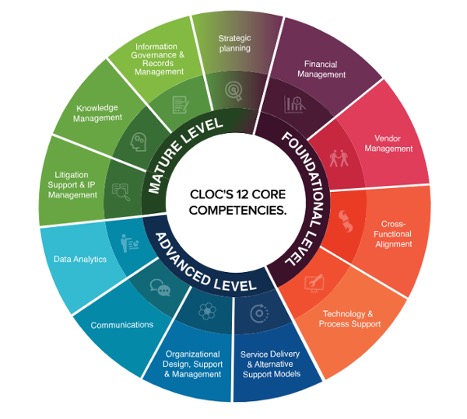5 Ways Legal Ops Drives Business Efficiency

What if you could make everything more efficient for your entire organization? A way to significantly transform your company and improve everything from greater data visibility, cost reductions, team productivity and even client engagement?
This is exactly what Legal Ops helps your business achieve.
The role of a legal ops team is to bring more efficiency and lower costs through increased automation, established processes and better infrastructure, and most important of all, to create value for the business. Legal Ops offers a truly transformative opportunity not only for legal, but for all departments to make their jobs easier, more efficient, and productive. These professionals are rewriting the rule book for companies and legal departments, saving money and time for their organizations.
The role of legal ops is widely different from providing legal advice in that it aims to run like a business: focusing on streamlining processes, improving efficiencies, reporting on data, and aligning with company goals.
Legal Ops has become one of the most crucial roles in an organization
Legal ops is a relatively new term for a relatively old concept: responsibility for making sure the legal side of an organization functions efficiently while ensuring compliance. This role is crucial to the success of a growing company. Inefficiencies have a whole range of impacts on an organization: it slows down business efforts, exposes the company to unnecessary risks, creates friction between teams and departments, and reveals missed opportunities to generate insights and further improve the cogs of the organization.

CLOC, the Corporate Legal Operations Consortium, founded in 2010 and focused on redefining the business of law, has had a great impact on the advancement of legal ops. Since it is based in the US, it’s also why there is often a difference between legal ops team sizes on that side of the Atlantic versus every other region in the world.
The focus of Legal Operations has shifted in the last ten years. Before, the focus was on risk management and trying to reduce outside counsel costs. Today, Legal Operations is an integrated, trusted business partner to the entire organization by identifying opportunities for automated processes and strategically use service providers to drive efficiency (while still reducing costs).
As CLOC’s core 12 model suggests, legal ops focuses on a number of functions that support a company with financial, vendor and technology management, as well as data analytics. Sadly, these competencies are still not part of the curriculum in law school and they very much fall under the responsibility of lawyers and to learn and develop.
👀 Recommended reading

New to In-house Legal? 5 Tips To Thrive In Your First 100 Days
We interviewed Wolfgang Vanas, Head of Legal at ecosio – here are his tips to build strong foundations for a successful and scalable legal function.
With the help of strategic insights that successfully structure the operations of a company to focus on business objectives, having a Legal Ops team can become one of the most valuable ways to grow a business. Most business leaders agree that Legal Operations plays a vital role in managing, controlling, and optimizing business functions and processes. They are largely responsible for ensuring that businesses generate and maintain shareholder value.
How Legal Ops transforms organizations to make them more efficient
Let’s make one thing clear – Legal Ops is not a replacement for legal departments. Instead, it works within and in tandem with the legal aspect of legal departments to make sure that the organization complies with law and regulations while improving their business processes.
More companies are using legal ops as a function that not only increases the efficiency of the in-house legal team, but the company as a whole. Legal operations introduces processes that hold the entire company together. From introducing systems to keep track of simple, manual tasks like expiry and renewal dates, to giving more autonomy to the sales team to manage the entire contracting process, or to enabling the finance department with extensive analytics to report on… the sky is the limit. This process can be extremely satisfying for the legal department, who tend to be perceived as the naysayers and the road blockers.
The process when looking to improve legal operations efficiency, as recommended by CLOC, is to first map out the people responsible for it, then the processes, and then look for any relevant legal tech the teams might need. This process will help the legal ops team to gain incredible insights into where the company is at in terms of automation and efficiency, what needs to be done first, and what can be left for later. This step-by-step process can also bring transparency to the forefront, where legal is seen as a strategist and forward-thinking department.
💡 52% of contracts need no legal input at Adverity, significantly improving efficiency for commercial departments. Learn how. 💡
Here are 5 areas where Legal Ops can increase your company’s efficiency
1. Documentation and legal document management
Legal ops helps document all the important information regarding a company’s agreements. This includes introducing and/or managing a document management system that will archive all legal documents in a central location for easy monitoring and reference. In practice, this drastically reduces the time it takes for a company to respond to a request for information, but also ensures GDPR compliance and smoothens out the contract management process for commercial teams.
The analytics collected from a document management system make sense of all of the data collected from both internal and external stakeholders. With these tools, your company, especially the finance team, can create insights and drive decisions related to vendors, customers, and business operations.
Specifically, implementing a document management tool helps inform company decisions regarding which vendors or business relationships are flourishing and which need improvement, as well as how to further smoothen out the negotiation process. Comparative data may also be used for client fee adjustments or easier methods of meeting client requirements. All-in-all, it allows businesses to optimize processes and structure workflows that centralize and prioritize work, freeing up time to focus on the work that matters most.
2. Ensuring compliance
It could easily be a full-time job to keep track of all the changes that are made to laws and regulations, so it’s important to have a legal operations professional onboard. The tools and processes set up by legal ops help monitor and analyze documents and make sure your company is clear on what it needs to do, when, and how. These processes ensure your business meets all legal requirements and stays compliant with all relevant laws, regulations, and established industry standards.
A well-organized legal management system will also keep the company updated on changes that need to be made to terms and conditions or privacy policies. Automating these processes increases visibility, reducing the chances of any legal issues from cropping up.
3. Financial and budget management
The role of legal ops is one that greatly helps the finance and budgeting departments of a company. This is because some of the duties of legal ops are identifying legal risks, reviewing the accuracy of financial documents and working with the finance team to make budget decisions based on sound data.
Generally, when it comes to budgeting and financial management, there is a lot of paperwork involved. Invoices, contracts, and purchase orders need to be sent and checked by the correct parties for approval and then get sent back to the right departments. It’s a never-ending cycle of paperwork. So when this work is done manually, mistakes are made and deadlines are missed.
By using a management system set up by Legal Ops, the right people can immediately view and approve documents in one central location online. This allows them to give feedback quickly and easily, to find the right information straight awya. And since such systems can usually integrate with other software, the details can be shared and sent to where they need to go. This further increases efficiency and removes paperwork.
4. Strategic planning
Legal ops is not the same as a legal team. Instead, they serve as liaisons for departments in the company to address their priorities and goals. By listening to the concerns of each department, they can build a roadmap to improve operations. So instead of solving problems in a company, they identify them. Once they are identified, the legal operations role is responsible for enacting measures so that these challenges are mapped out, tackled, and disappear in the long run.
Legal ops can help make decisions that will steer the strategic direction for the business. Through the lens of historical data, legal operations can effectively shape goals for legal and other departments, pinpointing key performance indicators and success metrics. By scrutinizing this legal data, they’re able to forecast future project expenses more accurately, leading to better control over all investments. These accurate forecasts empower the company to plan strategically, taking into account the anticipated cost of ongoing product development relative to the scale and demand for a service.

5. Legal tech solutions implementation
Traditionally, legal departments have always been at a disadvantage when it comes to using technology in their operations. This is partly due to a legality concern of digitizing processes (are e-signatures legal and safe?) and a traditional education focus on legal matters rather than business-oriented skills and competencies – which often go hand in hand with digital transformation.
Legal ops aims to bridge that gap by fusing law and technology to bring solutions to this inefficiency problem. The use of technology streamlines operations and meets the ongoing needs of both legal and other departments.
One example of legal tech that can be used to increase efficiency is to automate contract drafting and approval processes. With a lot of CLMs (contract lifecycle management systems), you can easily set up automated templates that can be used safely by anyone in the organization. With automated triggers, the right people will be pinged when they need to approve a contract like, say, when a contract value is above a certain threshold. This benefits both legal and commercial: commercial is empowered by legal to create their own contracts knowing that they’re using the right templates, while legal trusts that the right, high value contracts will land on their digital desks.
A growing company must also be prepared for the future, which means using technology to improve day-to-day operations in a scalable way. With the example above, legal will not be swamped with work when commercial increases business opportunities, but they will be able to focus on the high value work and collaboration rather than approving NDAs and simple contracts.
Efficiency is the key to drive value
While these 5 key elements to driving business efficiency are not an exhaustive list, they are a good starting point to understanding the role legal ops plays in driving strategic and business value to an organization. The legal industry has been left behind in the digital transformation, and these elements can help in-house legal to be active players the transformation.
At the end of the day, legal ops is all about efficiency. It’s about removing barriers and getting work done not only as quickly as possible, but also in a way that matches everyone’s needs and fixes frustrations. It’s about providing support for company goals while making the business processes as smooth as possible.
By automating and integrating legal operations processes, companies can be more effective and provide better services. It allows businesses to spend their time more efficiently, and legal to deliver real value to the business.
If you’re interested in learning more about the advantages of Legal Ops, be sure to read New to In-house Legal? 5 Tips to Thrive in Your First 100 Days. We discuss how to build a scalable legal fonction and what elements you should focus on first.



